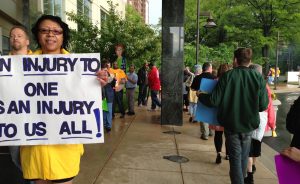“People say slavery is done… [but] it’s still there – in the corner,” says Gulnahar Alam, a domestic worker who, like many others, suffered workplace abuses. To combat this exploitation, often hidden away in employers’ homes, Alam began organizing. “People feel very powerful and so much more confident when they see that they are not alone. They no longer feel ashamed.”
Alam’s story is one of 18 brought to life in Shifting the Universe: Spoken Histories of Work & Resistance by first-time author Candace Wolf.
Professionally, Wolf is a storyteller; she’s also a keen listener. And from 2010-2015 she carved out time to hear the stories of regular people – from different walks of life and parts of the globe – who, despite serious challenges, evolve into troublemakers of the best kind.
The book couldn’t come at a better time. Amidst today’s political chaos, as President Trump stumbles towards possible impeachment, Wolf’s book offers a longer view.
“The long memory is the most radical idea in America. That long memory has been taken away from us,” said the late folk singer Utah Phillips, who Wolf quotes. “We’re being leapfrogged from one crisis to the next. You can’t remember what happened last week because you’re locked into this week’s crisis.”
Phillips’ solution is to “Go find your true elders.”
They are here, in Shifting the Universe, where readers hear from, in their own voices: an anti-war bicycle repairman in LA; a midwife inspired by Elijah Muhammad’s call to “take care of our own”; an Egyptian factory worker-turned-labor leader; the founder of the political art group Bread and Puppet Theater; and Roger Toussaint, a union leader born and raised in Trinidad, who led a major 2005 strike that won rights for New York’s beleaguered transit workers.
“I am proud not to have rested,” writes Wolf, “until I… stitched their words together into this ballad of work and resistance.”
The Priest
In one chapter, Wolf shares the story of a young priest in a poor fishing village in India who refused to wear religious garb, preferring “the ordinary dress of the people.”
Living among lay people, rather than in a customary mansion-like house, Father Thomas Kocherry spent seven years waking up before dawn to pray with the fishermen before joining them at sea.
With each passing year, Kocherry watched suffering grow as fish stocks dwindled due to huge foreign trawlers sucking up everything in the sea.
Kocherry initiated a fast, saying he would not eat until the government instituted an annual three-month ban on trawling so fish stocks could replenish themselves. After 11 days, the state finally responded by implementing a 45-day ban. “It was not what we demanded,” Kocherry explains. “But even so, it was a really major victory.” Or so it seemed.
Some trawlers ignored the ban and the police failed to hold them accountable. So the fishermen took on enforcement, too. A supporter recounts:
Suddenly hundreds of small boats appeared on the scene and surrounded [the trawler]. They told those fellows who were operating the ship, “We are going to set fire to your ship. If you want to save your life, come down now.” So the crew came down and the fishermen threw petrol on the ship and completely burnt it down.
The Teacher
In another chapter, readers are brought into a DC public school classroom.
After four or five years teaching at Sousa Middle School, Elizabeth Davis was amazed to learn of the school’s role in the famous 1954 Brown vs. Board of Education Supreme Court decision. But her excitement didn’t carry over to her students, who, like her, were black.
“It was so depressing because my students said, ‘Okay – so what? Ms. Davis, we’re not interested in that stuff,’” she recalls. “It did not resonate with them because… they were not familiar with the history of segregation because they did not experience any of it.”
Davis had. The daughter of a sharecropper, she was born on a farm in North Carolina and attended a segregated school system before moving to DC with her mother. In high school Davis helped organize a mass student walkout with Black Power leader Stokely Carmichael.
If Sousa’s history was going to come alive for her students, Davis needed to yank it out of the past.
So I came into the classroom and said: “Do you all know that one of the students filed a lawsuit against the principal because he would not let that boy come here. He told him that he was too black!” What!!!! Oh, the room was silent. “Who was it, Ms. Davis? Who was it? Oh! It must have been Tony… Is he suing”?
Davis then explained that this is what happened at Sousa, although not to their friends, but to other students a few decades ago. Their interest piqued, some of these students went on to help stop the city from tearing down Sousa, which was designated a National Historic Landmark in 2001.
Davis, meanwhile, is no longer at Sousa, or in the classroom. She’s now president of the Washington Teachers’ Union.
The Resistance
The spoken histories of Davis, Father Kocherry and the others in Shifting the Universe provide a rich tapestry of resistance. These individuals are not so much great people, as ordinary folks who set out to do great things. They don’t always succeed, but what else is  there do but try?
there do but try?
That’s what a forest guardian in Ecuador asks. “How can I resign?… To drop that defense would be to doom our generation. To condemn my children,” says Marlon Rene Santi Gualingo, whose indigenous community has been fighting for its survival for generations.
Meanwhile here in the U.S., Trump’s four-month presidency has spawned a vibrant resistance of its own. With this book, Wolf offers readers powerful examples of what’s possible.

